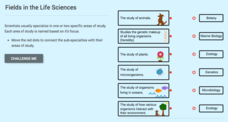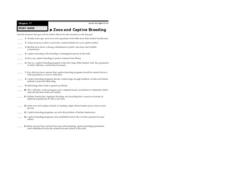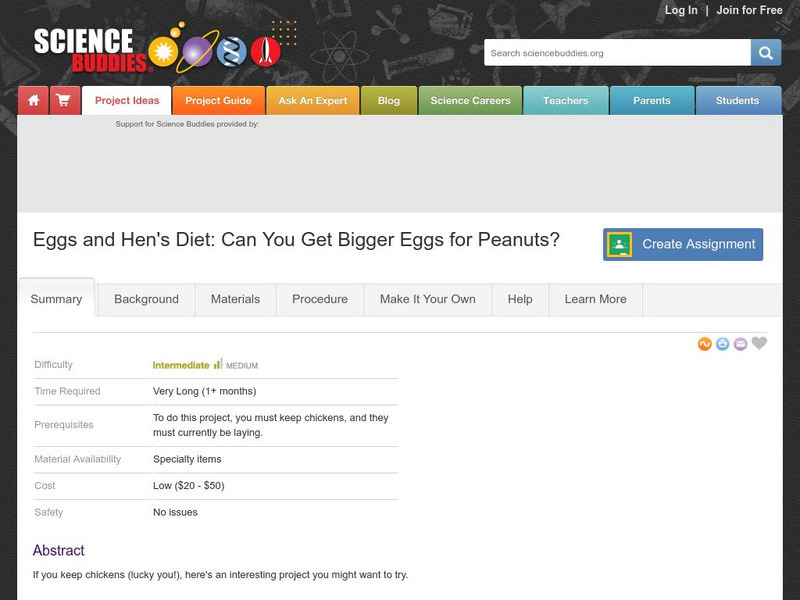American Museum of Natural History
Being a Zoologist: Sandra Olsen
Are your students wild about horses? Then introduce them Sandra Olsen, a zooarchaeologist, who has been studying horses and the people who herd them. Ms Olsen responds to 15 interview questions and details how she goes about her...
CK-12 Foundation
Fields in the Life Sciences
Many fields of study require a specialty and a sub-specialty as you progress through your education. Scholars learn about six sub-specialties of life science. From botany to zoology, our knowledge of the world of living organisms expands...
Curated OER
A Model for Natural Selection- Spaghetti Worms
Does the early bird really get the worm? If so, which color of worm does it prefer? In an exciting and easy week-long field investigation, young field biologists set up a one square meter feeding area for birds. If you have a webcam,...
Curated OER
The Animals
Fourth graders participate in a virtual field trip to the San Diego Zoo and complete various computer lab excercises to expand their understanding.
Curated OER
We're Zoologists!
Students listen to story, "Never, Ever Shout in a Zoo," by Karma Wilson, practice finding information from Internet, write information about one chosen zoo animal, draw picture of their zoo animal, pair up and read their My Zoo Animal...
Curated OER
Zoos and Captive Breeding
After reading pages 470-472 of an unspecified textbook, students compare statements about zoos and captive breeding to information presented in text for statements of truth. Students change statements that are false so that the...
Curated OER
Zoology Word Search
In this word search worksheet, students locate words related to the zoology. The word list includes class echinoidea, pedicellaria, and paleozoic.
Curated OER
Zoology Word Search Puzzle
In this zoology worksheet, students define, study and discuss nine key terms associated with zoology. Students circle each key term in a word search puzzle.
Curated OER
Zoology Word Search Puzzle
In this science worksheet, middle schoolers look for the words that are related to the concept of zoology that is reviewed in the sheet. They also acquire new vocabulary.
Curated OER
Zoology Word Search Puzzle
In this literacy worksheet, students practice looking for the words that are related to the idea that is focused upon in the sheet. The skill of spelling is used and vocabulary increases.
Curated OER
Branches of Science
In this science learning exercise, students locate and identify the various branches of science as they are named. There are 36 words/phrases located in the puzzle.
Curated OER
Camouflage in Animal Habitats
Middle schoolers investigate how animals in an ecosystem interact with a nonliving environment through camouflage. They work in cooperative groups to "go fishing" and record how many of each color of fish they "catch." After entering...
Curated OER
Look but Don't Touch:
Students complete a graphic organizer after identifying three interesting facts from a web site. They role play that the NASA space probe has landed on Mars where a large animal was found and they develop the important questions they...
Curated OER
It Takes All Kinds!
Students view video clips and observe similarities and differences between animals. They sort animals into groups for a zoo. They make a graph of their observations and review scientific classifications.
PBS
Pbs Learning Media: Rhinoceros Release
In this segment from Nature, Rangers release the Black rhino to a new location in Southern Africa where rhinos are previously endangered.
Science Buddies
Science Buddies: Career Profile: Zoologist and Wildlife Biologist
Wouldn't it be great to spend your day watching animals in their natural habitat or as natural as zoos can make the habitat? Being a zoologist or wildlife biologist does just that. Find out what education you need for this career in this...
Science Buddies
Science Buddies: Eggs and Hen's Diet: Can You Get Bigger Eggs for Peanuts?
The goal of this project is to determine whether feeding chickens a dietary supplement of peanuts will result in larger and heavier eggs. If peanuts do increase egg size, a secondary goal will be to determine the optimal amount of peanut...
Science Buddies
Science Buddies: How Much Worm Is a Worm?
Worms are slimy, wiggly, and gross. But did you know that they have many unique abilities? One of the neatest things that worms can do is regenerate, or re-grow, parts of their body. After a piece of a worm is cut off, it can grow back...
Science Buddies
Science Buddies: Bones and Calcium
Why is your grandmother always wondering if you are drinking enough milk? Our bones are made out of calcium, a mineral found in milk, and drinking milk can lead to strong healthy bones. What about other animals? What are their bones made...
Science Buddies
Science Buddies: What Is Home Sweet Home to a Bug?
If you had to choose between having your favorite dessert, going to a movie, or spending the night at a friend's house, which would you choose? This project shows you how you can "ask" a sowbug (or pill bug) a similar question in order...
Science Buddies
Science Buddies: Effects of Exercise: Changes in Carbon Dioxide Output
Everybody knows that your body needs oxygen to keep going, and that you breathe out carbon dioxide as waste. What happens when you exercise? You've probably noticed that you breathe faster, and your heart beats faster. What triggers your...
Science Buddies
Science Buddies: Finding Phyla
Animals come in all shapes and sizes, each a small part of the amazing diversity of life. These differences can also help us to classify animals into different groups. Which group do you belong to? Do this experiment to investigate the...
Science Buddies
Science Buddies: Go and Stop? Ant Traffic Signals
Have you ever stopped to watch a trail of ants moving back and forth between a food source and their nest? Have you ever wondered how they establish their trail? You've probably read that ants use chemical signals to communicate with one...
Science Buddies
Science Buddies: Antlion Pits in Open Sand or Under Leaf Cover
Antlion larvae are known for their predatory ways. In sandy areas, they dig pits to trap ants or other crawling insects that happen to stumble in. This project shows you how to create a mini-environment for antlion larvae to test their...























